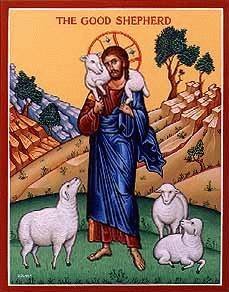
In the current issue of Leadership journal, there is an interview with megachurch pastor, Andy Stanley, who happens also to be the son of well-known radio preacher Dr. Charles Stanley.
I wonder if it's just a coincidence that he talks about pastors as shepherds since tomorrow is Good Shepherd Sunday in our lectionary (John 10).
Here is the pertinent quote:
Should we stop talking about pastors as "shepherds"?The rest of the interview is him describing the office of the ministry purely in business terms. According to him, the old pastor as shepherd model is outdated, culturally irrelavant, and should be supplanted. So if Jesus were around today, he wouldn't have said, "I am the good shepherd," but what? I am the good CEO? I am the good administrator? And whereas he told Peter to "feed my lambs," today he'd say what? Build my team? Grow my organization?
Absolutely. That word needs to go away. Jesus talked about shepherds because there was one over there in a pasture he could point to. But to bring in that imagery today and say, "Pastor, you're the shepherd of the flock," no. I never seen (sic) a flock. I've never spent five minutes with a shepherd. It was culturally relevant in the time of Jesus, but it's not culturally relevant any more.
 Incidentally, this reminds me of the C.S. Lewis quote from his Letters to Malcolm: Chiefly on Prayer where he says that Christ told Peter to "feed my sheep," not "experiment on my rats" or "teach my dogs new tricks."
Incidentally, this reminds me of the C.S. Lewis quote from his Letters to Malcolm: Chiefly on Prayer where he says that Christ told Peter to "feed my sheep," not "experiment on my rats" or "teach my dogs new tricks."If you erase the image of shepherd from the biblical teaching on the pastoral ministry and substitute it with purely business related motifs, you come up with a quite different animal. And it alters the nature and office of Jesus Christ, our Good Shepherd.
Two thoughts:
- Pay attention to what kind of books your pastor reads. If he does not read, encourage him to do so. The congregation should expect their pastors to be bookish and scholarly. Not nerdy or geeky or socially inept. Nor neglecting his other duties. But as St. Paul stated, "apt to teach." When your pastor spends an afternoon reading and mulling over a text of theology, he is not relaxing. He is not wasting time. He is working. Studying is working. But what does he read? Check his bookshelves, if you can. My point is this. Andy Stanley said that the only books he reads are "business and history." History, I get. And business, OK. But that is it? What about books of doctrine, biblical studies, apologetics, church history, current events, etc.? What about fine works of literature, old and new?
- Pay attention to your pastor's vocabulary. When he speaks, is it the language of business/management that you hear primarily? Or the lingo of the behavioral sciences? Or is it biblical and theological?
I'm not saying that using vocabulary from other disciplines is necessarily bad or wrong. And I'm definitely not in favor of archaic haughty church-speak that no one understands. In the balance, it is a fact that God's Church has its own vocabulary and ways of defining things. We must not be shy about that. But at the same time that we speak God's Word accurately and faithfully, we can learn to do so in a down-to-earth manner. Just as you are what you eat, to a great extent you are what you read. And how we speak - especially when it comes to God, His Christ and the salvation of sinners - truly shapes and determines (not merely reflects) how we think.

Sphere: Related Content




